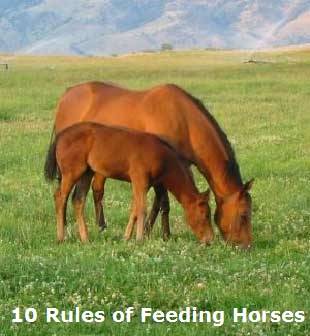10 RULES OF FEEDING A HORSE: What are ten golden rules of feeding horses?
Following these steps will help you make up the best nutritional feeds for a healthy horse.
A little extra knowledge will help you keep your horse or pet pony in peak condition throughout the year.
10 Rules for Feeding Horses
You want to avoid common maladies caused by poor or inappropriate horse nutrition. Try these ten simple ground rules for feeding and watering horses and keep your horse or pony in tiptop health.
1. Horses need Access to Clean Water
Horses need access to fresh clean water and it should be available at all times. Remember to keep all containers clean and secure when you use them to store water for horses.
By following the rules for watering horses you will provide them with constant access to a clean bucket or trough. The best place to keep the water bucket is a cool and shaded environment.
As a rule a horse can drink more than 18 litres a day (five gallons). The amount horses drink increases to nearer 40 litres a day if the horse is in a hot environment or working hard.
2. Feeding a Horse by Weight
It is best to feed a horse by weight and not by volume. That means you should be feeding them by the correct quantities of food. Weigh each scoop individually for the different types of feed you might use.
3. Feeding Horses Little and Often
Feed your horses with food concentrates. Feeding a horse is best done little and often rather than in large oversized meals.
Note: Adding chaff to the diet encourages a horse to chew and aids its digestion.
The general ground rules for feeding and watering horses is to provide them with at least two feeds a day.
You can increase it to four feeds a day when their work levels get increased.
Each feed should contain no more than two kilograms of concentrates. Giant sized intermittent feeds tend to stress a horse’s digestive system.

4. Use High Quality Horse Feeds
Perhaps the most important of all 10 rules of feeding horses and ponies is to use high quality feed stocks. Avoid the temptation to give your horse mouldy or dusty old feed.
5. Rules of Feeding Horses by Body Weight
Horses have individualised weight and temperament. Feed your equine companion according to their body weight and their particular temperament.
6. Change Horse Diets Gradually
Digestive upsets are common when you make big changes to a horse’s diet. Make gradual changes to concentrates, grass, and roughage. Doing so reduces the risks of a stomach upset.
7. Allow Rest after Feeding Horses
You might want to provide fibre feeds for your horse closer to its exercise times. But, it is best not to feed them at least 1 hour before exercising or working hard – or immediately after.
8. Feed a Horse by Routine
Horses are like humans when it comes to a daily routine and habit. So it is best to feed horses close to the same time every day whenever possible.
9. Increase Food Quantities Accordingly
Most horse owners know that you should increase a horse’s energy output and work levels gradually. The same is true for their feed quantities. Make a gradual increase in horse feed quantities as their workload increases.
Allowing a horse to graze during a typical UK winter is unlikely to provide them with high quality grass. Horses’ grazing can get supplemented with hay. You may find this a necessity if the outside air temperature drops below five Celsius.
10. Provide Equines with Ample Fibre
Lots of good quality long fibre is ideal for a horse to eat. Nowadays, most equines thrive on a high fibre diet. It helps to reduce the risk of stomach upsets and stimulates a healthy gut function. As a rule at least 50% of your horse’s diet should be high quality fibrous roughage.
ALSO IN THIS SECTION
Horses in the Road: Check out the safety rules for riding a horse on the roadways.
Equestrian Crossings: Learn how to use Highway Code road crossings for horse riders.
Fox Hunting Rules: A guide about the laws for hunting foxes in the United Kingdom.
Horses on Farms: The legal requirements of having horses on farms and in livery yards.

